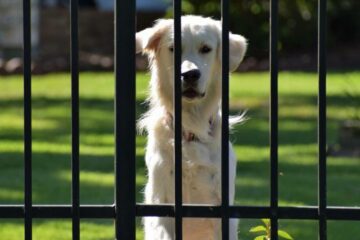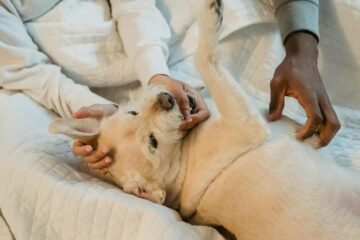Dog Behavior Changes at Night? Why Your Dog Gets Aggressive at Night
When dog behavior changes at night, with them going from a happy, easygoing dog to a growling, barking, aggressive one, it can be very scary! Fortunately, in this article, we’ll explain not only why your dog gets aggressive at night, but also the signs of aggression in dogs to look for, the command to calm them, and of course how to treat the problem at its root.
We’re also going to go over more specific areas of this topic, such as how to deal with owner-directed aggression at night, and the differences in tackling this issue when it’s a puppy or older dog that’s having the problem. Keep reading for all this and more below!
Dog Behavior Changes at Night

Noticing changes in dog behavior at night can be unsettling, with differences ranging from increased restlessness to more obvious signs of aggression. Understanding why these changes occur and how to address them is important for maintaining a peaceful and safe environment both for the dog and the household.
Dog Gets Aggressive at Night
If your dog gets aggressive at night, it could be due to a variety of factors. Changes in lighting and shadows can cause confusion and fear, leading to defensive behavior. Additionally, if your dog is not getting enough exercise or mental stimulation during the day, pent-up energy can manifest as aggression at night.
Signs of Aggression in Dogs
The signs of aggression in dogs can vary but typically include growling, baring teeth, stiffening of the body, and focused staring. If your dog exhibits these behaviors, especially at night, it’s important to take them seriously. Aggression can be a sign of underlying issues such as fear, discomfort, or even medical conditions that require attention.
Teach Dog to Settle
Training your dog to settle on command can be an effective way to manage nighttime aggression:
- Choose a quiet time and place to start the training. Use a calm voice and a consistent command, such as “settle.”
- Encourage your dog to lie down in a relaxed position. You can gently guide them into place if needed.
- Reward them with treats and praise as soon as they comply and show relaxed behavior.
- Practice regularly and gradually introduce the command in different environments, including at night.
Changes in dog behavior at night, such as increased aggression, can be due to various factors. Recognizing the signs and using the ‘settle’ command will help, remember that the underlying behavioral issues (fear, anxiety, etc.) that were causing all of this to begin with will still be present.
And until you address those, any positive changes you see will only be temporary.
“Well, how do I make these changes last?”
By getting your dog to truly choose to follow your direction, that’s how. I tried many times to write out how you can do that before deciding it made more sense to just link you to the free video series that explains it better than I’d ever be able to.
The series is by a man named Dan who is one of the world’s leading dog obedience trainers. In it, he teaches you how to put an end to things like your dog getting aggressive at night (or at any other time) and all other misbehavior using his fast and easy-to-follow methods.
In the first video, Dan will reveal to you why the two most common methods of dog training only doom you to failure. You can watch the video now by clicking here. Follow the proven system he’ll show you in his series and you’ll never have to spend another second worrying about your dog’s night aggression ever again!
Owner-Directed Aggression at Night

Dealing with owner-directed aggression in dogs at night can be a challenging and distressing experience. This type of aggression, where a dog shows hostile behavior towards its owner, can escalate during nighttime hours for various reasons including confusion, anxiety, and health issues which worsen in the evening.
Causes of Dog Aggression Towards Owner at Night
Owner-directed aggression at night can stem from several factors. It could be linked to the dog’s confusion or anxiety due to low light conditions, disrupting their ability to recognize even familiar people.
Health issues such as pain or discomfort that worsen at night can also contribute to aggression. Additionally, a lack of sufficient mental and physical stimulation during the day might lead to pent-up energy and frustration, showing itself as aggressive behavior at night. Try the “settle” command to calm them. You can learn it in the first section.
Signs a Dog Will Bite You
The signs a dog will bite you can include growling, snarling, baring teeth, and a stiff body posture. You may also notice more subtle warning signs like a hard stare, lip licking, or yawning. It’s important to be aware of these signals and to avoid pushing the dog further into a state of distress, as this could lead to a bite.
How to Calm a Dog Down at Night
Calming a dog down at night requires a patient and consistent approach. Creating a peaceful environment for your dog is important. This may include providing a comfortable and secure sleeping area and using soft lighting to reduce confusion and fear. Establishing a relaxing and consistent bedtime routine can also help.
In summary, owner-directed aggression in dogs at night is a serious concern that needs to be addressed thoughtfully. Understanding the causes, recognizing warning signs of potential aggression, and implementing calming strategies are key components in managing this behavior. Consistent and patient training, coupled with a soothing nighttime routine, can significantly help.
Why Does My Dog Get Aggressive at Night?

Your dog gets aggressive at night due to a range of possible factors, from environmental changes to underlying health issues like anxiety. Nighttime aggression in dogs can be confusing and concerning. It indicates that the dog is experiencing discomfort, stress, or anxiety that becomes worse during the night.
Why Is My Dog Aggressive at Night?
Your dog is aggressive at night possibly due to changes in their environment or routine that occur during these hours. Diminished light can lead to confusion which can become displays of sudden aggression towards you especially in older dogs who may have declining vision.
Additionally, a lack of adequate exercise or mental stimulation during the day can result in pent-up energy, leading to aggression at night. It’s also important to consider any potential sources of pain or discomfort that might worsen in the evening.
Why Does My Dog Get Aggressive at Bedtime?
Your dog gets aggressive at bedtime potentially because of the disruption of their routine or a negative association with bedtime activities. If bedtime coincides with the dog being left alone or isolated, this can trigger anxiety or stress-induced aggression.
It’s also possible that your dog feels territorial about their sleeping space or is responding to a change in their sleeping environment. You can learn to calm them by teaching them the “settle” command. We explain it in the first section.
My Dog Gets Grumpy at Night
Your dog gets grumpy at night for reasons that might include tiredness after a long day, feeling unwell, or reacting to a lack of attention from family members who are winding down. Grumpiness can be a sign of a dog feeling overwhelmed or needing some quiet time.
Ensuring that your dog has a comfortable and calm place to rest in the evening can help address this behavior.
In summary, nighttime aggression in dogs can be a sign of various underlying issues, from environmental changes to health-related problems. Understanding why your dog behaves differently at night is key to addressing their needs and helping them feel more relaxed and secure.
Why Does My Puppy Get Aggressive at Night?

Your puppy gets aggressive at night due to various factors that can influence their behavior after dark. It’s not uncommon for young dogs to show changes in temperament during the evening, which can be attributed to a mix of environmental, developmental, and psychological reasons.
Puppy Aggression at Night: Is It Just a Phase?
Puppy aggression at night can sometimes be a phase linked to their development. As puppies grow, they go through various stages, including periods where they may test boundaries or react to changes in their environment.
Factors like overtiredness, overstimulation during the day, or even the onset of fear periods common in puppyhood can contribute to this nighttime aggression.
How to Calm an Aggressive Puppy
Calming an aggressive puppy at night involves creating a soothing environment and maintaining a consistent routine. Ensure your puppy has a comfortable sleeping area and try to limit overstimulation in the hours leading up to bedtime.
Gentle, positive reinforcement training can also help. The “settle” command is tailor-made for these types of situations, for example. You can learn it now in the first section. If your puppy is showing signs of aggression, respond with calmness and consistency, and avoid punishment, which can exacerbate fear or anxiety.
Are Puppies Scared of the Dark?
Puppies, like humans, can be scared of the dark, which could lead to aggressive behavior at night. If your puppy seems particularly anxious or unsettled in darker environments, it might be worth considering a night light, leaving some ambient light on, or playing quiet music. This can provide them with a sense of security and help alleviate any fear or anxiety that might be contributing to their aggression.
Here’s a video with music to help your puppy stay calm in the dark:
In summary, nighttime aggression in puppies can be caused by various factors, including developmental stages, environmental changes, and even fear of the dark. Understanding the root causes and responding with appropriate calming techniques and consistent training can help your puppy feel more secure and reduce aggressive behaviors.
Senior Dog Aggressive at Night

If your senior dog is aggressive at night, it’s a situation that needs careful understanding and management. As dogs age, they can exhibit changes in behavior, including increased aggression during the night. This shift can be due to various age-related factors, from health issues to changes in their sensory capabilities.
Why Is My Older Dog Aggressive at Night?
Your older dog is aggressive at night possibly because of age-related conditions such as arthritis or vision loss, which can make them more susceptible to discomfort or fear, especially in low-light conditions.
Cognitive decline, akin to dementia in humans, can also cause confusion and anxiety in older dogs, leading to aggression. It’s important to consider these health aspects when addressing your senior dog’s nighttime behavior.
Elder Dog Aggressive at Night All of a Sudden
If your elder dog is aggressive at night all of a sudden, you should consider any recent changes in their environment or routine that might be contributing to this behavior. Additionally, the onset of new health issues could be a factor.
Sudden aggression can be a sign of pain or discomfort, so a veterinary check-up is recommended to rule out any underlying medical conditions. It’d also be a good idea to ensure they know commands like “settle,” which you can learn now in the first section.
Signs Old Dog Wants to Be Left Alone
The signs an old dog wants to be left alone can include growling, retreating to a quiet place, or showing discomfort when approached or touched. Older dogs may need more rest and can become irritable if disturbed. It’s important to respect their space and to provide a comfortable, quiet area where they can retreat undisturbed.
In summary, aggression in senior dogs at night can be attributed to a variety of age-related factors, including health issues and changes in their sensory and cognitive functions. Understanding these factors and responding with empathy, along with ensuring your dog’s comfort and seeking veterinary advice for sudden behavior changes, can help in managing aggression in older dogs.
Remember, as dogs age, their needs and behaviors can change, and adapting to these changes is key to providing them with a happy and comfortable life in their senior years.
You’re probably ready to get started now that you have all of your questions about your dog getting aggressive at night answered, so I’ll let you begin. Best wishes, and thank you for reading our article “Dog Behavior Changes at Night? Why Your Dog Gets Aggressive at Night”.





